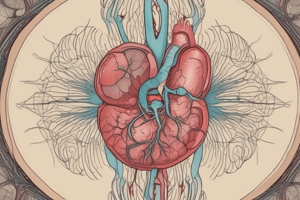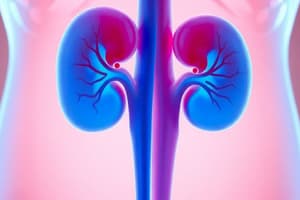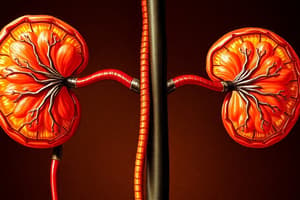Podcast
Questions and Answers
What is the function of the glomerulus in the nephron?
What is the function of the glomerulus in the nephron?
- Maintaining electrolyte balance
- Controlling blood pressure
- Filtering the blood to create glomerular filtrate (correct)
- Regulating blood pH
Which component of the kidney is responsible for regulating blood pressure?
Which component of the kidney is responsible for regulating blood pressure?
- Loop of Henle
- Tubule (correct)
- Glomerulus
- Proximal convoluted tubule
What is the main function of nephrons in the renal system?
What is the main function of nephrons in the renal system?
- Regulating electrolyte balance
- Maintaining blood pH
- Filtering the blood (correct)
- Producing urea
How do kidneys help in maintaining the balance of essential electrolytes in the body?
How do kidneys help in maintaining the balance of essential electrolytes in the body?
Which part of the nephron is responsible for reabsorption of essential substances back into the bloodstream?
Which part of the nephron is responsible for reabsorption of essential substances back into the bloodstream?
What is the role of the loop of Henle in the nephron?
What is the role of the loop of Henle in the nephron?
What is the main function of the collecting duct in the nephron?
What is the main function of the collecting duct in the nephron?
Which organ in the urinary system acts as a storage reservoir for urine before it is expelled from the body?
Which organ in the urinary system acts as a storage reservoir for urine before it is expelled from the body?
How do kidneys help regulate blood pressure?
How do kidneys help regulate blood pressure?
Which of the following is NOT a function of the kidneys?
Which of the following is NOT a function of the kidneys?
What is the role of nephrons in the renal system?
What is the role of nephrons in the renal system?
How do kidneys contribute to homeostasis in the human body?
How do kidneys contribute to homeostasis in the human body?
Flashcards are hidden until you start studying
Study Notes
The Renal System: Understanding Kidneys, Nephrons, Urinary System, and Renal Function
The renal system, also known as the urinary system, is a vital part of our body that plays a crucial role in maintaining homeostasis. Let's explore the components and functions of this essential system.
Kidneys
Two bean-shaped organs, called kidneys, are situated just below the rib cage on either side of the spine. Kidneys have several key functions, including:
- Filtering waste: The blood stream enters the kidneys, which filter out waste products, such as urea, and excess ions like sodium and potassium.
- Regulating pH: Kidneys help control the pH of the blood by either increasing or decreasing the amount of acid or base in the body.
- Regulating blood pressure: Kidneys help regulate blood pressure by secreting hormones that control blood volume and blood vessel constriction.
- Electrolyte balance: Kidneys help maintain the balance of essential electrolytes, such as sodium, potassium, and chloride, in the body.
Nephrons
Each kidney is composed of over a million tiny, microscopic units called nephrons, which are the primary filters of the blood. Each nephron has two main components: the glomerulus and the tubule.
- Glomerulus: A network of tiny blood vessels that filters the blood to create a filtrate called the glomerular filtrate.
- Tubule: The tubule is composed of three sections: the proximal convoluted tubule, loop of Henle, and distal convoluted tubule. Each section performs specific functions to modify the filtrate, concentrating and removing waste products.
The final portion of the nephron is the collecting duct, which transports urine from nephrons to the renal pelvis.
Urinary System
The urinary system is a series of organs and ducts that work together to form, store, and eliminate urine from the body:
- Renal pelvis: The funnel-shaped pouch at the center of the kidney collects urine from the collecting ducts.
- Ureters: These are muscular tubes that transport urine from the kidneys to the urinary bladder.
- Urinary bladder: A balloon-shaped organ that stores urine until it is expelled from the body.
- Urethra: A tube that carries urine out of the body.
Renal Function
The kidneys perform several vital functions that maintain the body's homeostasis. These include:
- Elimination of waste: Kidneys excrete waste products, such as urea, to maintain a healthy body.
- Regulation of pH: Kidneys help maintain the pH balance of the blood, ensuring proper functioning of cells and organs.
- Regulation of blood pressure: Kidneys help regulate blood pressure by secreting hormones, such as renin and angiotensin II, which control blood volume and blood vessel constriction.
- Electrolyte balance: Kidneys help maintain the body's balance of essential electrolytes, such as sodium, potassium, and chloride.
In summary, the renal system is an essential part of the human body, consisting of the kidneys, nephrons, and the urinary system. Kidneys, through their filtering and hormonal actions, help maintain homeostasis by eliminating waste, regulating pH, blood pressure, and electrolyte balance. Understanding the renal system and its components and functions is essential for maintaining good health and preventing kidney-related diseases.
Studying That Suits You
Use AI to generate personalized quizzes and flashcards to suit your learning preferences.




